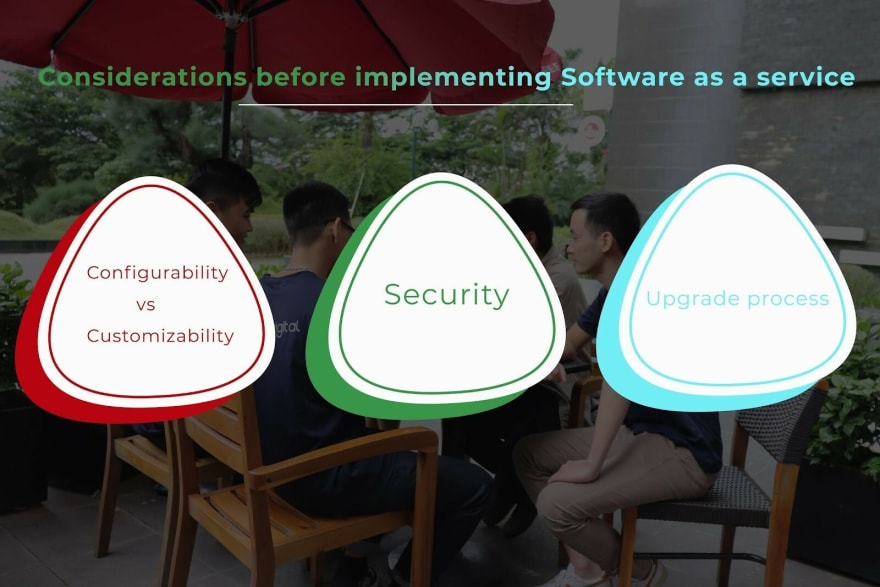33
Tasks for considering before SaaS implementation
Undeniably, SaaS adoption provides extremely notable advantages to businesses. However, there are series of tasks done before implementation that developers might miss.
In fact, the growth rate of the software as a service solution has been very high, around 16.4% each year, due to its application in many industries, including office software, real-time messaging software, customer management software, etc.
Unfortunately, a number of SaaS implementation processes and tasks should be aware before. Respecting the process assures the benefits of SaaS adoption successfully.
Software as a service is the system that provides an intriguing alternative to traditional on-premise mobile software installations. Using the Software as a service offers many potential impacts over the conventional models of business software installation, including:
- Reduce time to benefit: Different from the traditional model, the Software in Software as a service is already installed and configured in the cloud. Using Software as a service can minimize delays, time spent on installation, and failures caused by traditional software development.
- Reduce application cost: In comparison with the traditional model, SaaS solutions can significantly lower the price, as it usually resides in a shared or multi-tenant environment, where has no up-front license fees. Furthermore, the maintenance costs have decreased as well. Evidently, the SaaS service providers owned the development environment and allowed all customers to use it.
- Flexibility both for business and users: SaaS solutions enable scaling quickly for both business and user. It is designed to integrate many users to work together and prove a seamless opportunity to add new users and features. Also, the advantage of SaaS is allowing users to add new services and solutions without forcing any software, and the information can be shared easily between teams at any time from multiple devices.
Implementing Software as a service is accelerating due to the fact that many organizations are recognizing the benefits of it in digital transformation. However, before adopting SaaS, firstly, businesses should be aware of three distance models of SaaS to realize the restrictions:
- A Precise multi-tenant solution (there is a single database and one instance of the code)
- A hybrid solution (There is also a single code, but the database is separated for every customer)
- A single-tenant, hosted solution (each customer has their own code and physical database instance)
Secondly, it's essential to understand the underlying technical considerations to fit the company's needs:

Multi-tenant and hybrid solutions allow for configuration but typically not customization. On the other hand, a single-tenant solution allows for customer-specific customization without impacting the core codebase. It requires careful consideration of which solution is suitable for the customer's requirements.
In general, software as a service tends to be secure. However, once it is hosted in a public cloud, it can be vulnerable. Also, when implementing a SaaS solution, end-users tend to be the weakest link in the security chain, which requires data encryption at both rest and in transit. Network security is another factor that should be paid attention to, especially if the application is integrated with other applications.
Implementing multi-tenant solutions meaning customers typically have no control over the upgrade process. On the other hand, hybrid and single-tenant solutions offer more flexibility. However, they induce some limitations of being supported or End of Life.

Hiring the right SaaS provider has become critical as an increasing number of consumers, especially software development businesses, seek to externalize their IT systems. It's not surprising to see a myriad of SaaS service providers that deliver a large number of services. Hence, it causes businesses challenging to select the right provider. Following are key factors to consider when choosing a SaaS provider which helps businesses create a better decision.
A decent understanding of specific business requirements is critical before selecting any SaaS vendor, including technical service, service requirement, data governance, and data security. The selection process includes clarifying all the business's needs to compare with what the provider is offering. From that, businesses are more straightforward to select or benchmarking a SaaS provider, which fits the requirements.
SaaS provider's technology and platform should be suitable with business objectives and the current IT industry to manage the workload. Notably, significant challenges come up when new software deployment is migrated to the new platform. A proper SaaS provider could assist businesses with these challenges through data migration tools, pre-made training tools, or consulting assistance on either front.
When selecting SaaS service providers, a business should consider which provider plans fitting to the long-term goals. The business needs research of the SaaS vendor expertise. It considers technology features, integration roadmap, and interoperability to get a better idea of future work.
Undoubtedly, implementing Software as a service offers several advantages. However, we have seen many considerations that should be aware in deciding on whether to be a SaaS provider or simply a user. Careful consideration of the factors described above will become vital in having a successful outcome for applying the SaaS plan.
33
